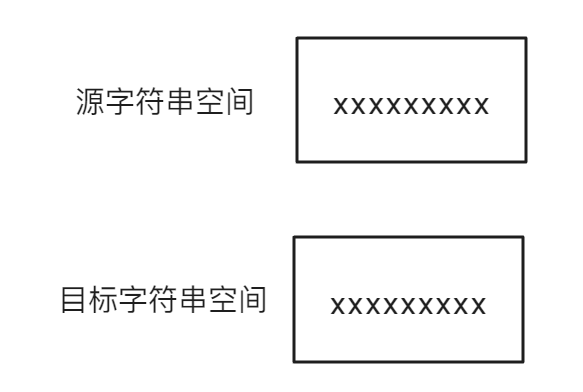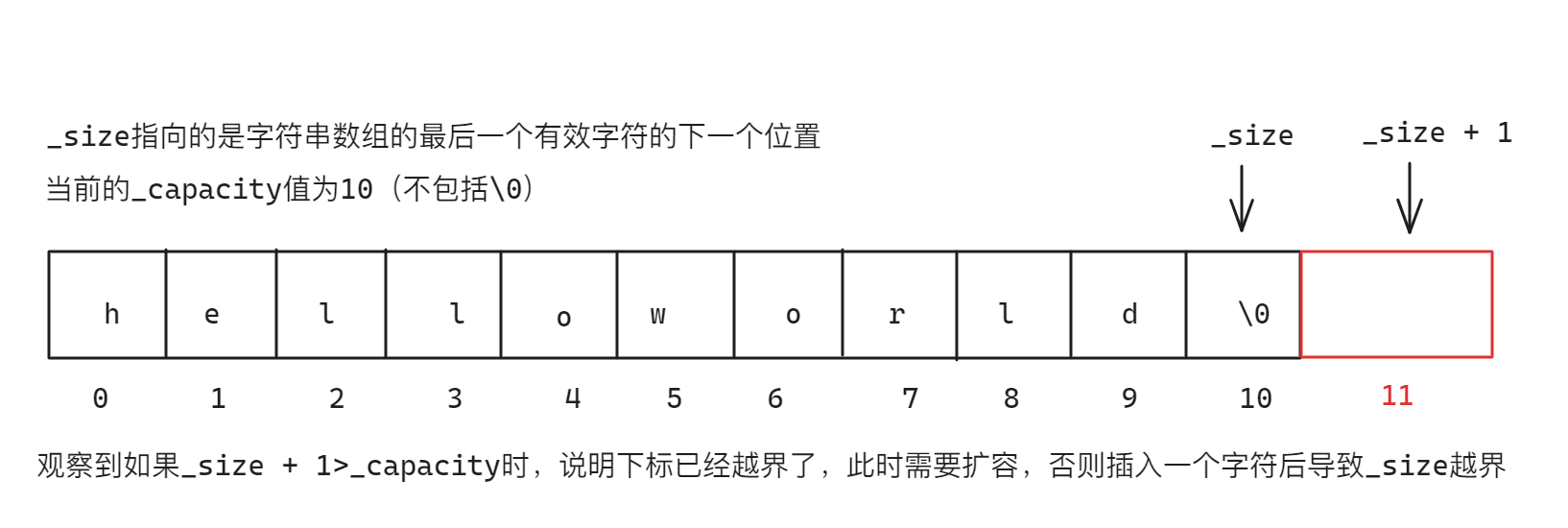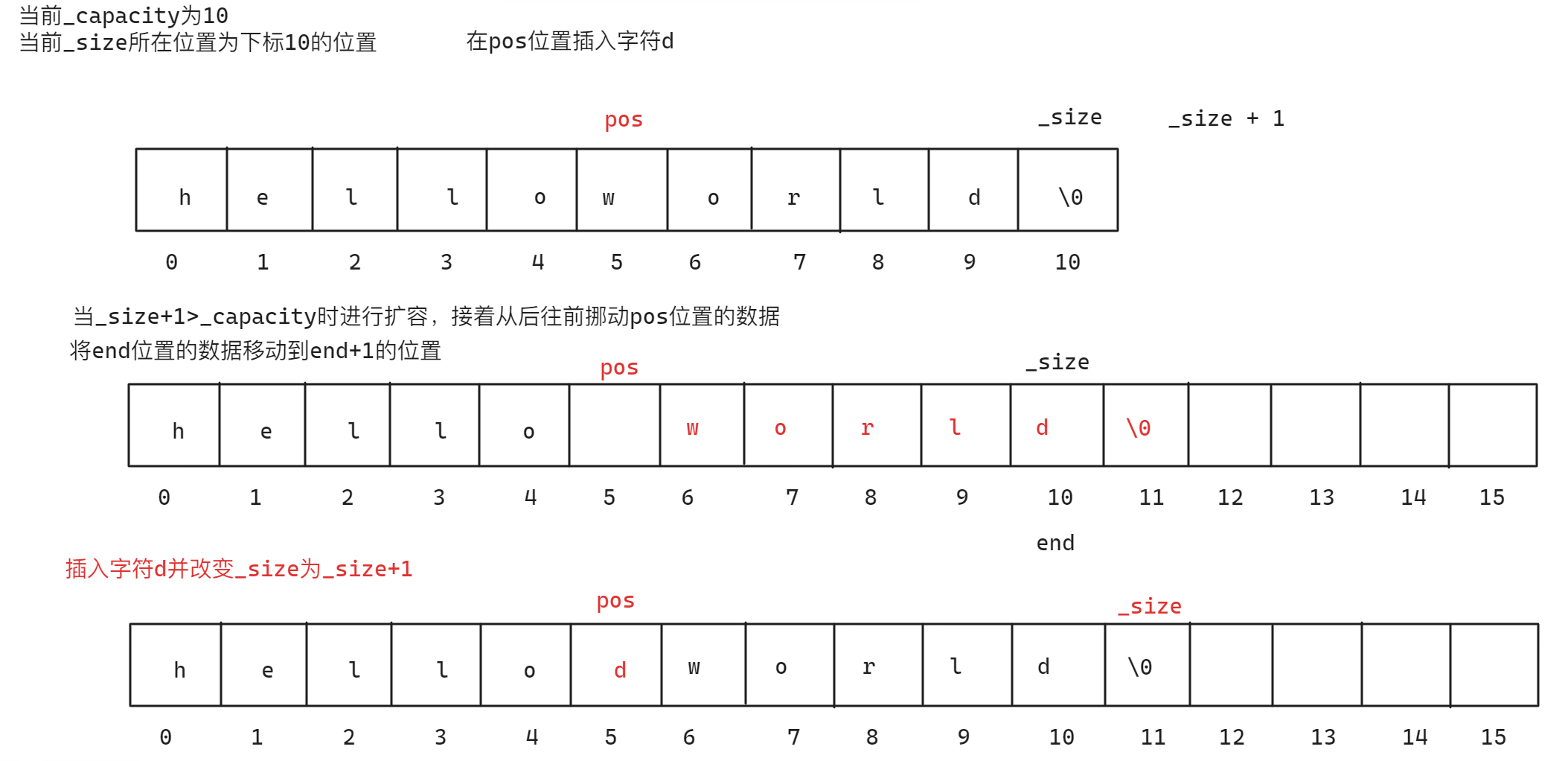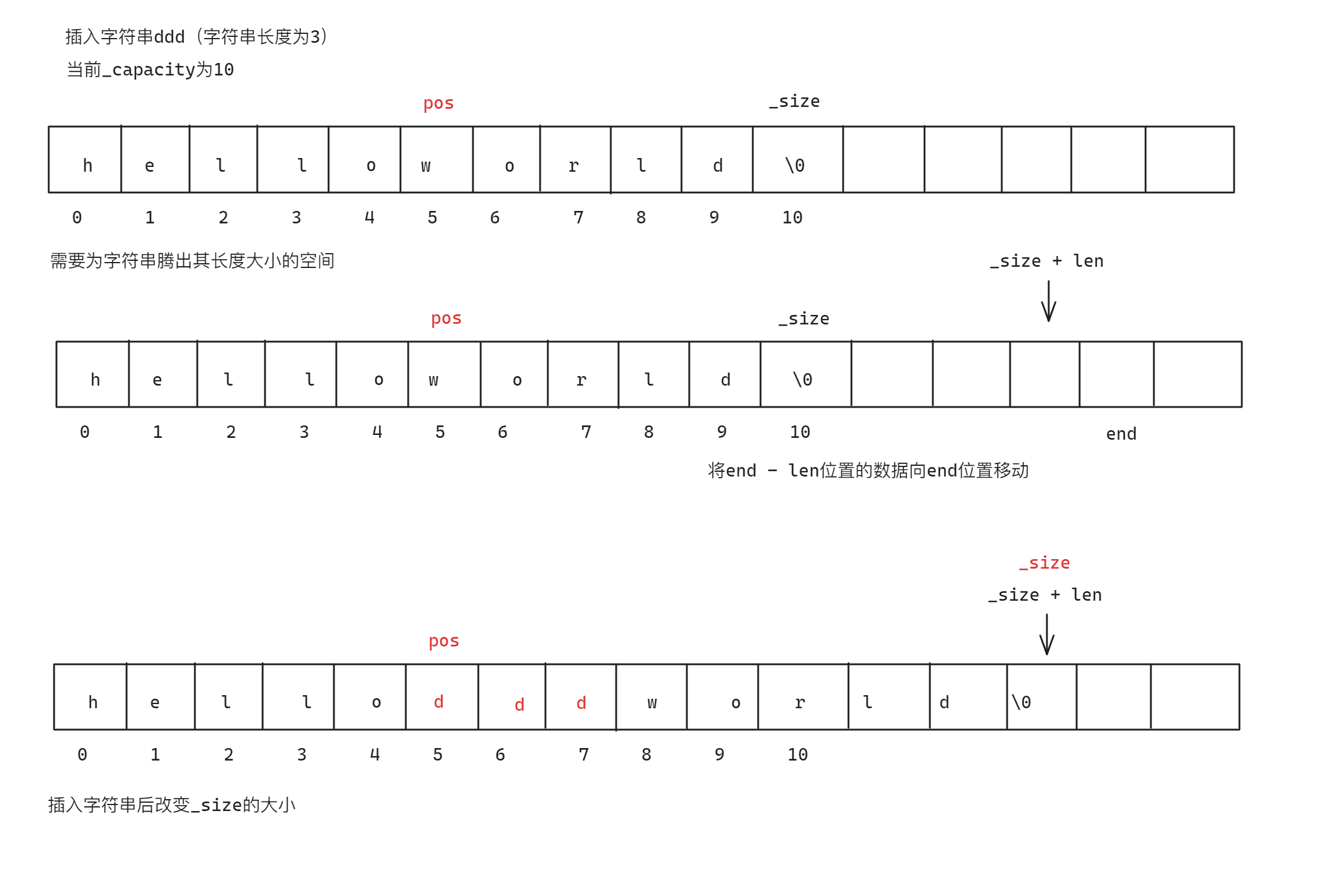string类的模拟实现¶
约 2941 个字 422 行代码 10 张图片 预计阅读时间 15 分钟
string类的模拟实现¶
string类最大元素个数¶
在C++标准库中,定义了一个名为npos的变量,该变量的原型如下:
| C++ | |
|---|---|
1 2 3 4 5 6 7 | |
static的变量初始化必须在类外赋值,但是此时使用const就可以在类内初始化,之所以这个行为可行,是因为在C++中,被const修饰的变量具有内部链接属性,所以其修饰的变量在值为字面量或者是编译期可以确定值时,可以作为在编译期确定值的常量,而因为是常量,则必须要初始化。但是现在就有第二个问题,为什么const修饰的变量都具有常量属性了,还需要再用static修饰一遍,这里是因为const修饰的变量只是其值可以在编译期确定,但是其生命周期还是跟随对象的,而static变量在类加载时就创建了,而不需要等到创建对象,如果在创建类对象时,某一个成员使用到了const变量,但是这个变量创建的顺序在使用到const变量的成员之前,此时就会出现成员属性链接错误,所以为了防止这个问题出现,就需要使用static修饰 Note
上面的说法只能适用于常量类型为整型,所以为了更加强调上面的情况,在C++11中引出了constexpr关键字,更加强调某一个变量的值是可以在编译时期计算的,具体见C++11新特性,此时上面的代码就可以修改为constexpr size_t npos = -1
string类的构造函数¶
在设计string类的构造函数时,需要考虑到下面三个问题:
- 是否需要传递参数,即是否需要提供有参及无参构造函数
- 如何为字符串数组开辟空间,空间开辟的大小为多少
- 字符串数组的容量和有效数据个数之间的关系如何
针对上面三个问题,提出以下的解决方案:
- 在提供类构造函数时,需要为类提供两种构造函数:1. 有参构造 2. 无参构造。对于有参构造来说可以实现以类对象来构造或者以常量字符串来构造,而对于无参构造函数来说,可以不需要额外提供,只需要在以常量字符串构造的函数给一个空字符串
""(空字符串不是没有内容,默认包含\0)作为缺省值即可 - 对于第二个问题,字符串数组开辟多大空间,对于无参构造函数来说,如果确保有缺省值可以防止出现空指针解引用的问题;而对于有参的构造函数来说,因为已经确定参数是个字符串,所以参数字符串的长度(不包括
\0)作为初始大小以确保在开始时有足够空间 - 因为标准库中的
capacity不计入\0占用的大小,所以本次模拟实现时capacity也不计入\0的个数,那么capacity即为字符串长度+1,但是第二个问题:因为使用的是缺省参数,所以无参就使用缺省值,而因为缺省值为1,如果在尾插时涉及到使用capacity进行扩容,那么会导致只能插入一个字符,后续字符将无法插入,所以综上capacity也需要给缺省值
| C++ | |
|---|---|
1 2 3 4 5 6 7 8 9 | |
string类拷贝构造函数¶
虽然编译器默认会提供拷贝构造函数,但是该构造函数只能完成浅拷贝,如果对字符串数组进行浅拷贝,那么会出现两个问题:
- 两个指针指向同一个位置,当一个指针修改数组中的内容时,另一个指针指向的数组中的内容也会改变
- 当调用析构函数时,因为两个指针指向同一个位置,当一个指针被析构后,另一个指针并不会不析构,此时导致程序崩溃
所以为了避免上面的问题,string类的拷贝构造函数需要自行设计从而进行深拷贝
在设计string类的拷贝构造函数需要考虑到空间开辟的问题,因为是拷贝某一个对象中的内容,所以可以考虑使用该对象的capacity,但是注意需要+1,因为capacity不包括\0的占用空间
Note
注意拷贝构造函数的初始化列表为_size初始化
| C++ | |
|---|---|
1 2 3 4 5 6 7 8 | |
string类析构函数¶
对于析构函数来说,只需要释放开辟的空间即可,因为使用的是new[]进行的空间开辟,所以需要使用delete[]进行空间释放
| C++ | |
|---|---|
1 2 3 4 5 | |
string类c_str()函数¶
因为C形式字符串是内置类型,所以使用cout打印时编译器会自动识别类型,相当于使用%s进行打印字符串,只需要返回字符串数组首字符地址即可
| C++ | |
|---|---|
1 2 3 4 5 | |
string类中的[]运算符重载函数¶
对于下标引用操作符来说,只需要返回当前下标对应位置的字符即可,但是需要注意的是要判断传入的位置是否合法
Note
为了减少返回值拷贝到临时变量的消耗,推荐使用引用返回
非const版本:
| C++ | |
|---|---|
1 2 3 4 5 6 7 | |
const版本:
| C++ | |
|---|---|
1 2 3 4 5 6 | |
string类中的赋值运算符重载¶
虽然编译器默认会生成赋值运算符重载函数,但是对于内置类型和自定义类型都是浅拷贝,所以需要自行重载赋值运算符。
对于赋值运算符重载函数来说,需要考虑到空间是否足够的问题,有下面三种情况需要考虑:
对于上面的三种情况来说,可以考虑的解决方式为:
- 对于第一种情况,使用大的一方的空间
- 对于第二种情况,扩容目标字符串空间,再将源字符串空间的内容赋值到目标字符串空间
- 对于第三种情况,释放目标字符串空间,再为目标字符串重新开辟空间,将源字符串空间的内容拷贝到目标字符串空间
但是,上面的解决方式过于复杂,所以考虑下面的思路:
不论是哪一种情况,先以目标字符串空间为基础开辟新的空间,再将源字符串中的内容直接拷贝到新的空间,这一步可以确保如果空间开辟失败不会影响源字符串中的内容,释放源字符串的空间,接着使源字符串的指针指向新的空间
Note
- 注意处理自己给自己赋值的情况
- 至于为什么要「释放源字符串的空间」,因为
this当前指向的是赋值运算符左侧的变量,该变量在赋值之前还指向着原来开辟的空间,如果不进行释放就会出现原来开辟的空间因为赋值覆盖失去了唯一的变量指向导致空间持续占用产生的内存泄漏问题
| C++ | |
|---|---|
1 2 3 4 5 6 7 8 9 10 11 12 13 14 15 16 17 | |
string类中获取字符串有效字符个数¶
对于_size来说,在函数外是不可以被修改的,所以返回const类型的变量,为了非const对象和const对象都可以调用该函数,用const修饰this指针
| C++ | |
|---|---|
1 2 3 4 5 | |
string类中获取字符串存储空间大小(不包括\0)¶
对于_capacity来说,在函数外是不可以被修改的,所以返回const类型的变量,为了非const对象和const对象都可以调用该函数,用const修饰this指针
| C++ | |
|---|---|
1 2 3 4 5 | |
string类reserve()函数¶
对于扩容函数来说,只需要处理好原始空间的释放以及原始空间的内容不丢失即可
Note
注意,当扩容的大小小于原始大小时不能进行缩容
| C++ | |
|---|---|
1 2 3 4 5 6 7 8 9 10 11 12 13 14 15 | |
string类push_back()函数¶
对于push_back()函数来说,需要考虑的问题是插入数据时是否需要扩容
解决思路也很简单,因为直插入一个字符串,所以只需要将原来的容量+1即可
何时需要进行扩容
| C++ | |
|---|---|
1 2 3 4 5 6 7 8 9 10 11 12 13 | |
string类append()函数¶
对于append()函数的分析与push_back()函数相同,此处不再分析
| C++ | |
|---|---|
1 2 3 4 5 6 7 8 9 10 11 12 13 | |
string类+=运算符重载函数¶
| C++ | |
|---|---|
1 2 3 4 5 6 7 8 9 10 11 12 13 14 15 | |
string类关系运算符重载¶
底层直接调用strcmp()函数
| C++ | |
|---|---|
1 2 3 4 5 6 7 8 9 10 11 12 13 14 15 16 17 18 19 20 21 22 23 24 25 26 27 28 29 30 31 32 33 34 35 36 37 38 39 40 41 42 43 44 45 46 47 48 49 50 51 52 53 54 55 56 57 58 | |
string类基础迭代器实现¶
当前实现的迭代器是模拟指针的方式进行实现
| C++ | |
|---|---|
1 2 3 4 5 6 7 8 9 10 11 12 13 14 15 16 17 18 19 20 21 22 23 | |
string类resize()函数¶
在模拟实现resize()函数时,需要注意resize()不同于reserve()函数
reserve()函数只是对原有的字符串空间进行扩容,并且如果扩容的大小小于原始大小,那么将不执行扩容,而resize()函数需要分为下面三种情况:
-
当扩容的大小小于
size时,将对原始字符串进行删除,直到只剩下给定大小个数的字符构成的字符串 -
当扩容的大小介于
size和capacity之间时,在原始字符串末尾进行初始化 -
当扩容大小大于
capacity时,则需要对原始空间先进行扩容,再对扩充的空间进行初始化
| C++ | |
|---|---|
1 2 3 4 5 6 7 8 9 10 11 12 13 14 15 16 17 18 19 20 21 22 23 24 25 26 27 | |
string类insert()函数¶
对于insert()函数来说有插入字符和插入字符串两种类型
首先对于插入字符来说,基本思路如下:
| C++ | |
|---|---|
1 2 3 4 5 6 7 8 9 10 11 12 13 14 15 16 17 18 19 20 21 | |
但是需要注意一点,上面的方法在头部插入字符时会出现死循环以及越界访问(当前pos和end均为size_t类型),因为当end走到-1的位置时本应是最后一次循环,但是由于其为size_t类型,导致-1表示整型的最大值,从而造成end+1依旧大于pos,并且_str[end + 1] = _str[end]此时越界访问
可以考虑下面的修改方式
| C++ | |
|---|---|
1 2 3 4 5 6 7 8 9 10 11 12 13 14 15 16 17 18 19 20 21 22 23 24 25 26 27 | |
也可以将上方代码优化成下面的代码,思路如下
| C++ | |
|---|---|
1 2 3 4 5 6 7 8 9 10 11 12 13 14 15 16 17 18 19 20 21 22 | |
插入字符串的思路也是一样,只是挪动数据的个数以及插入字符串的方式改变
| C++ | |
|---|---|
1 2 3 4 5 6 7 8 9 10 11 12 13 14 15 16 17 18 19 20 21 22 | |
string类erase()函数¶
erase()函数只是删除字符或者字符串的功能,注意需要分情况讨论:
- 当需要删除字符的个数小于字符串字符个数时,直接向前覆盖,再最后一个位置加入
\0改变_size即可 - 当需要删除的字符个数大于字符串字符个数时,全部删除,此时只需要在
pos位置加入\0改变_size即可
| C++ | |
|---|---|
1 2 3 4 5 6 7 8 9 10 11 12 13 14 15 16 17 18 19 20 21 22 | |
string类find()函数¶
find()函数也有两种类型,一种是找字符,另一种是找字符串
首先是找字符,直接挨个比较即可
| C++ | |
|---|---|
1 2 3 4 5 6 7 8 9 10 11 12 13 | |
接着是找字符串,调用strstr()函数即可
| C++ | |
|---|---|
1 2 3 4 5 6 7 8 9 10 | |
string类swap()函数¶
| C++ | |
|---|---|
1 2 3 4 5 6 | |
string类clear()函数¶
| C++ | |
|---|---|
1 2 3 4 5 6 | |
string类流插入运算符重载¶
设计思路参考C++默认成员函数,下面直接给出代码:
| C++ | |
|---|---|
1 2 3 4 5 6 7 8 9 | |
string类流提取运算符重载¶
重载流提取运算符时需要注意使用cin对象中的get()函数,将空格当做有效字符处理,否则直接使用cin将无法读取空白字符导致死循环
| C++ | |
|---|---|
1 2 3 4 5 6 7 8 9 10 11 12 13 14 15 16 17 18 19 20 21 22 23 24 25 26 | |









